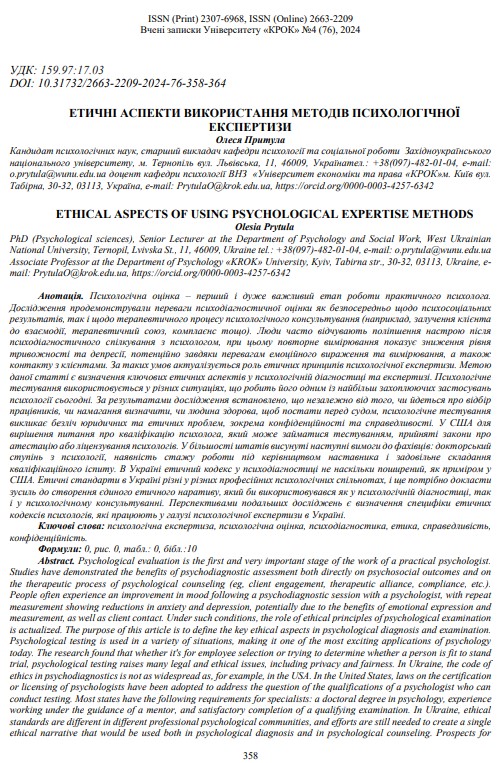ETHICAL ASPECTS OF USING PSYCHOLOGICAL EXPERTISE METHODS
DOI:
https://doi.org/10.31732/2663-2209-2024-76-358-364Keywords:
psychological examination, psychological assessment, psychodiagnosis, ethics, justice, confidentialityAbstract
Abstract. Psychological evaluation is the first and very important stage of the work of a practical psychologist. Studies have demonstrated the benefits of psychodiagnostic assessment both directly on psychosocial outcomes and on the therapeutic process of psychological counseling (eg, client engagement, therapeutic alliance, compliance, etc.). People often experience an improvement in mood following a psychodiagnostic session with a psychologist, with repeat measurement showing reductions in anxiety and depression, potentially due to the benefits of emotional expression and measurement, as well as client contact. Under such conditions, the role of ethical principles of psychological examination is actualized. The purpose of this article is to define the key ethical aspects in psychological diagnosis and examination. Psychological testing is used in a variety of situations, making it one of the most exciting applications of psychology today. The research found that whether it's for employee selection or trying to determine whether a person is fit to stand trial, psychological testing raises many legal and ethical issues, including privacy and fairness. In Ukraine, the code of ethics in psychodiagnostics is not as widespread as, for example, in the USA. In the United States, laws on the certification or licensing of psychologists have been adopted to address the question of the qualifications of a psychologist who can conduct testing. Most states have the following requirements for specialists: a doctoral degree in psychology, experience working under the guidance of a mentor, and satisfactory completion of a qualifying examination. In Ukraine, ethical standards are different in different professional psychological communities, and efforts are still needed to create a single ethical narrative that would be used both in psychological diagnosis and in psychological counseling. Prospects for further research are the determination of the specifics of ethical codes of psychologists working in the field of psychological expertise in Ukraine.
Downloads
References
Arslan, R. (2018). A review on ethical issues and rules in psychological assessment. Journal of Family Counseling and Education, 3(1), 17-29.
Brock, R. L., Barry, R. A., Lawrence, E., Dey, J., & Rolffs, J. (2012). Internet administration of paper-and-pencil questionnaires used in couple research: Assessing psychometric equivalence. Assessment, 19(2), 226-242.
Cole, M. S., Bedeian, A. G., & Feild, H. S. (2006). The measurement equivalence of web-based and paper-and-pencil measures of transformational leadership: A multinational test. Organizational Research Methods, 9(3), 339-368.
Horáka, F., Lackob, D., & Klocekb, A. (2021). Legal Consciousness: A Systematic Review of its Conceptualization and Measurement Methods1. Anuario de Psicología Jurídica, 31, 9-34.
Muñiz, J., & Bartram, D. (2007). Improving international tests and testing. European Psychologist, 12(3), 206-219.
Palladino Schultheiss, D. E., Stead, G. B., & Liao, C. Y. (2019). Ethical Issues in Testing and Assessment. International Handbook of Career Guidance, 755-775.
Rothstein, M. G., & Goffin, R. D. (2006). The use of personality measures in personnel selection: What does current research support? Human resource management review, 16(2), 155-180.
Sherman, C. A., Gordon, G. M., & Edger, K. (2013). Ethical and legal considerations for confidentiality in counseling. Counseling Ethics: Philosophical and Professional Foundations, 117-146.
Stoll, J., Müller, J. A., & Trachsel, M. (2020). Ethical issues in online psychotherapy: A narrative review. Frontiers in psychiatry, 10, 498-439.
Tippins, N. T., Beaty, J., Drasgow, F., Gibson, W. M., Pearlman, K., Segall, D. O., & Shepherd, W. (2006). Unproctored internet testing in employment settings. Personnel Psychology, 59(1), 189-225.

Downloads
Published
How to Cite
Issue
Section
License

This work is licensed under a Creative Commons Attribution-NonCommercial 4.0 International License.

